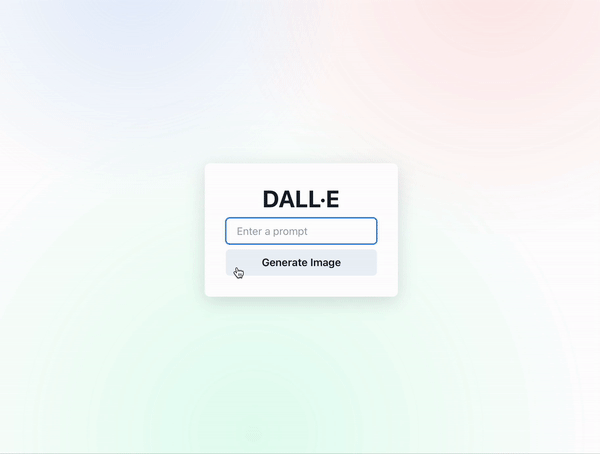+ Searching for Pynecone? You are in the right repo. Pynecone has been renamed to Reflex. +English | 简体中文 | 繁體中文 | Türkçe | हिंदी | Português (Brasil) | Italiano | Español | 한국어
Open a terminal and run (Requires Python 3.8+):
pip install reflexInstalling reflex also installs the reflex command line tool.
Test that the install was successful by creating a new project. (Replace my_app_name with your project name):
mkdir my_app_name
cd my_app_name
reflex initThis command initializes a template app in your new directory.
You can run this app in development mode:
reflex runYou should see your app running at http://localhost:3000.
Now you can modify the source code in my_app_name/my_app_name.py. Reflex has fast refreshes so you can see your changes instantly when you save your code.
Let's go over an example: creating an image generation UI around DALL·E. For simplicity, we just call the OpenAI API, but you could replace this with an ML model run locally.
Here is the complete code to create this. This is all done in one Python file!
import reflex as rx
import openai
openai.api_key = "YOUR_API_KEY"
class State(rx.State):
"""The app state."""
prompt = ""
image_url = ""
processing = False
complete = False
def get_image(self):
"""Get the image from the prompt."""
if self.prompt == "":
return rx.window_alert("Prompt Empty")
self.processing, self.complete = True, False
yield
response = openai.Image.create(prompt=self.prompt, n=1, size="1024x1024")
self.image_url = response["data"][0]["url"]
self.processing, self.complete = False, True
def index():
return rx.center(
rx.vstack(
rx.heading("DALL·E"),
rx.input(placeholder="Enter a prompt", on_blur=State.set_prompt),
rx.button(
"Generate Image",
on_click=State.get_image,
is_loading=State.processing,
width="100%",
),
rx.cond(
State.complete,
rx.image(
src=State.image_url,
height="25em",
width="25em",
)
),
padding="2em",
shadow="lg",
border_radius="lg",
),
width="100%",
height="100vh",
)
# Add state and page to the app.
app = rx.App()
app.add_page(index, title="reflex:DALL·E")
app.compile()Let's start with the UI.
def index():
return rx.center(
...
)This index function defines the frontend of the app.
We use different components such as center, vstack, input, and button to build the frontend. Components can be nested within each other
to create complex layouts. And you can use keyword args to style them with the full power of CSS.
Reflex comes with 60+ built-in components to help you get started. We are actively adding more components, and it's easy to create your own components.
Reflex represents your UI as a function of your state.
class State(rx.State):
"""The app state."""
prompt = ""
image_url = ""
processing = False
complete = FalseThe state defines all the variables (called vars) in an app that can change and the functions that change them.
Here the state is comprised of a prompt and image_url. There are also the booleans processing and complete to indicate when to show the circular progress and image.
def get_image(self):
"""Get the image from the prompt."""
if self.prompt == "":
return rx.window_alert("Prompt Empty")
self.processing, self.complete = True, False
yield
response = openai.Image.create(prompt=self.prompt, n=1, size="1024x1024")
self.image_url = response["data"][0]["url"]
self.processing, self.complete = False, TrueWithin the state, we define functions called event handlers that change the state vars. Event handlers are the way that we can modify the state in Reflex. They can be called in response to user actions, such as clicking a button or typing in a text box. These actions are called events.
Our DALL·E. app has an event handler, get_image to which get this image from the OpenAI API. Using yield in the middle of an event handler will cause the UI to update. Otherwise the UI will update at the end of the event handler.
Finally, we define our app.
app = rx.App()We add a page from the root of the app to the index component. We also add a title that will show up in the page preview/browser tab.
app.add_page(index, title="DALL-E")
app.compile()You can create a multi-page app by adding more pages.
📑 Docs | 🗞️ Blog | 📱 Component Library | 🖼️ Gallery | 🛸 Deployment
Reflex launched in December 2022 with the name Pynecone.
As of July 2023, we are in the Public Beta stage.
- ✅ Public Alpha: Anyone can install and use Reflex. There may be issues, but we are working to resolve them actively.
- 🔶 Public Beta: Stable enough for non-enterprise use-cases.
- Public Hosting Beta: Optionally, deploy and host your apps on Reflex!
- Public: Reflex is production ready.
Reflex has new releases and features coming every week! Make sure to ⭐ star and 👀 watch this repository to stay up to date.
We welcome contributions of any size! Below are some good ways to get started in the Reflex community.
- Join Our Discord: Our Discord is the best place to get help on your Reflex project and to discuss how you can contribute.
- GitHub Discussions: A great way to talk about features you want added or things that are confusing/need clarification.
- GitHub Issues: Issues are an excellent way to report bugs. Additionally, you can try and solve an existing issue and submit a PR.
We are actively looking for contributors, no matter your skill level or experience. To contribute check out CONTIBUTING.md
Reflex is open-source and licensed under the Apache License 2.0.





